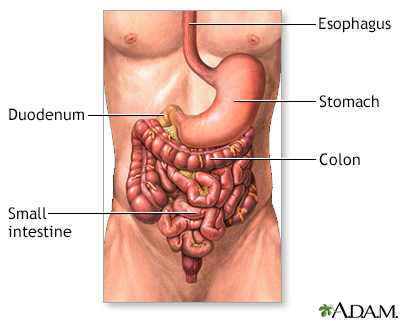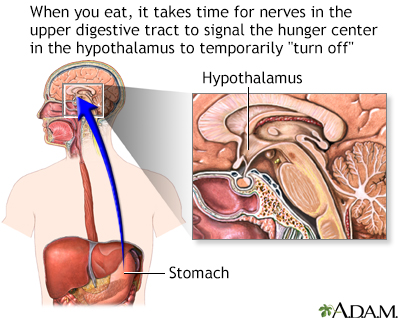Appetite - increased
Hyperphagia; Increased appetite; Hunger; Excessive hunger; Polyphagia
Increased appetite means you have an excess desire for food.
Images


Considerations
An increased appetite can be a symptom of different diseases. For example, it may be due to a mental condition or a problem with an endocrine gland.
An increased appetite can come and go (intermittent), or it can last for long periods of time (persistent). This will depend on the cause. It does not always result in weight gain.
The terms "hyperphagia" and "polyphagia" refer to someone who is focused only on eating, or who eats a large amount before feeling full.
Causes
Causes may include:
- Anxiety
- Certain medicines (such as corticosteroids, cyproheptadine, and tricyclic antidepressants)
- Bulimia (most common in women 18 to 30 years old)
- Diabetes mellitus (including gestational diabetes)
- Graves disease
- Hyperthyroidism
- Hypoglycemia
- Premenstrual syndrome
Home Care
Emotional support is recommended. Counseling may be needed in some cases.
If a medicine is causing increased appetite and weight gain, your health care provider may decrease your dose or have you try another medicine. Do not stop taking your medicine without talking to your provider.
When to Contact a Medical Professional
Contact your provider if:
- You have an unexplained, persistent increase in appetite
- You have other unexplained symptoms
What to Expect at Your Office Visit
Your provider will do a physical exam and ask questions about your medical history. You also may have a psychological evaluation.
Questions may include:
- What are your typical eating habits?
- Have you begun dieting or do you have concerns about your weight?
- What medicines are you taking and have you recently changed the dose or started new ones? Do you use any illicit drugs?
- Do you get hungry during sleep? Is your hunger related to your menstrual cycle?
- Have you noticed any other symptoms such as anxiety, palpitations, increased thirst, vomiting, frequent urination, or unintentional weight gain?
- Blood tests, including a chemistry profile
- Thyroid function tests
Related Information
Endocrine glandsReferences
Clemmons DR, Nieman LK. Approach to the patient with endocrine disease. In: Goldman L, Cooney KA, eds. Goldman-Cecil Medicine. 27th ed. Philadelphia, PA: Elsevier; 2024:chap 202.
Jensen MD, Bessesen DH. Obesity. In: Goldman L, Cooney KA, eds. Goldman-Cecil Medicine. 27th ed. Philadelphia, PA: Elsevier; 2024:chap 201.
Katzman DK, Norris ML. Feeding and eating disorders. In: Feldman M, Friedman LS, Brandt LJ, eds. Sleisenger & Fordtran's Gastrointestinal and Liver Disease. 11th ed. Philadelphia, PA: Elsevier; 2021:chap 9.
BACK TO TOPReview Date: 10/9/2024
Reviewed By: Linda J. Vorvick, MD, Clinical Professor, Department of Family Medicine, UW Medicine, School of Medicine, University of Washington, Seattle, WA. Also reviewed by David C. Dugdale, MD, Medical Director, Brenda Conaway, Editorial Director, and the A.D.A.M. Editorial team.

Health Content Provider
06/01/2025
|
A.D.A.M., Inc. is accredited by URAC, for Health Content Provider (www.urac.org). URAC's accreditation program is an independent audit to verify that A.D.A.M. follows rigorous standards of quality and accountability. A.D.A.M. is among the first to achieve this important distinction for online health information and services. Learn more about A.D.A.M.'s editorial policy, editorial process and privacy policy. A.D.A.M. is also a founding member of Hi-Ethics. This site complied with the HONcode standard for trustworthy health information from 1995 to 2022, after which HON (Health On the Net, a not-for-profit organization that promoted transparent and reliable health information online) was discontinued. |
The information provided herein should not be used during any medical emergency or for the diagnosis or treatment of any medical condition. A licensed medical professional should be consulted for diagnosis and treatment of any and all medical conditions. Links to other sites are provided for information only -- they do not constitute endorsements of those other sites. © 1997- 2025 A.D.A.M., a business unit of Ebix, Inc. Any duplication or distribution of the information contained herein is strictly prohibited.
